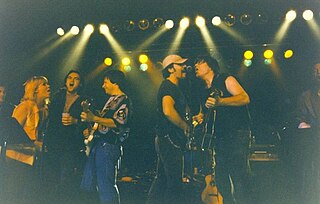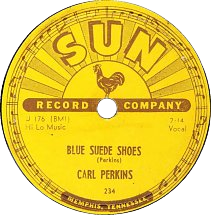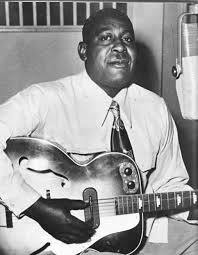
Soul music is a popular music genre that originated in the African American community throughout the United States in the late 1950s and early 1960s. It has its roots in African-American gospel music and rhythm and blues. Soul music became popular for dancing and listening in the United States, where record labels such as Motown, Atlantic and Stax were influential during the Civil Rights Movement. Soul also became popular around the world, directly influencing rock music and the music of Africa.

Billy Rose was an American impresario, theatrical showman and lyricist. For years both before and after World War II, Billy Rose was a major force in entertainment, with shows such as Billy Rose's Crazy Quilt (1931), Jumbo (1935), Billy Rose's Aquacade (1937), and Carmen Jones (1943). As a lyricist, he is credited with many songs, notably "Don't Bring Lulu" (1925), "Tonight You Belong To Me" (1926), "Me and My Shadow" (1927), "More Than You Know" (1929), "Without a Song" (1929), "It Happened in Monterrey" (1930) and "It's Only a Paper Moon" (1933).

The Rock Bottom Remainders, also known as the Remainders, was an American rock charity supergroup, consisting of published writers, most of them both amateur musicians and popular English-language book, magazine, and newspaper authors. The band took its self-mocking name from the publishing term "remaindered book", a work of which the unsold remainder of the publisher's stock of copies is sold at a reduced price. Their performances collectively raised $2 million for charity from their concerts.
Acid rock is a loosely defined type of rock music that evolved out of the mid-1960s garage punk movement and helped launch the psychedelic subculture. Named after lysergic acid diethylamide (LSD), the style is generally defined by heavy, distorted guitars, lyrics with drug references, and long improvised jams. Much of the style overlaps with 1960s garage punk, proto-metal, and early heavy, blues-based hard rock.

"Blue Suede Shoes" is a rock-and-roll standard written and first recorded by American singer, songwriter and guitarist Carl Perkins in 1955. It is considered one of the first rockabilly records, incorporating elements of blues, country and pop music of the time. Perkins' original version of the song appeared on the Cashbox Best Selling Singles list for 16 weeks and spent two weeks at the number two position.
The origins of rock and roll are complex. Rock and roll emerged as a defined musical style in the United States in the early to mid-1950s. It derived most directly from the rhythm and blues music of the 1940s, which itself developed from earlier blues, the beat-heavy jump blues, boogie woogie, up-tempo jazz, and swing music. It was also influenced by gospel, country and western, and traditional folk music. Rock and roll in turn provided the main basis for the music that, since the mid-1960s, has been generally known simply as rock music.

"That's All Right Mama" is a song written and originally performed by blues singer Arthur Crudup and recorded in 1946. It "stands as a convincing front-runner for rock ‘n’ roll’s ground zero", according to one source. It is best known as the debut single recorded and released by Elvis Presley. Presley's version was recorded on July 5, 1954, and released on July 19, 1954, with "Blue Moon of Kentucky" as the B-side. It was ranked number 113 on the 2010 Rolling Stone magazine list of the "500 Greatest Songs of All Time".

Arthur William "Big Boy" Crudup was an American Delta blues singer, songwriter and guitarist. He is best known, outside blues circles, for his songs "That's All Right" (1946), "My Baby Left Me" and "So Glad You're Mine", later recorded by Elvis Presley and other artists.
Dave Marsh is an American music critic, author, editor and radio talk show host. He was an early editor of Creem magazine, has written for various publications such as Newsday, The Village Voice, and Rolling Stone, and has published numerous books about music and musicians, mostly focused on rock music. He is also a committee member of the Rock and Roll Hall of Fame.

American popular music has had a profound effect on music across the world. The country has seen the rise of popular styles that have had a significant influence on global culture, including ragtime, blues, jazz, swing, rock, bluegrass, country, R&B, doo wop, gospel, soul, funk, punk, disco, house, techno, salsa, grunge and hip hop. In addition, the American music industry is quite diverse, supporting a number of regional styles such as zydeco, klezmer and slack-key.

"Good Rocking Tonight" is a jump blues song originally released in 1947 by its writer, Roy Brown and was covered by many recording artists. The song includes the memorable refrain, "Well I heard the news, there's good rocking tonight!" The song anticipated elements of rock and roll music.
"Saturday Night Fish Fry" is a jump blues song written by Louis Jordan and Ellis Lawrence Walsh, best known through the version recorded by Louis Jordan and His Tympany Five.

"Rock Me Baby" is a blues standard that has become one of the most recorded blues songs of all time. It originated as "Rockin' and Rollin'", a 1951 song by Lil' Son Jackson, itself inspired by earlier blues. Renditions by Muddy Waters and B.B. King made the song well-known. When B.B. King's recording of "Rock Me Baby" was released in 1964, it became his first single to reach the Top 40 in Billboard magazine's Hot 100 chart.

This is a detailed discography for American rock and roll, country, and gospel singer-songwriter Jerry Lee Lewis. One of the pioneers of rockabilly, Lewis has recorded over 40 albums in a career spanning seven decades. Lewis is a versatile artist, and has recorded songs in multiple genres. Lewis, in 1986, was one of the first inductees into the Rock and Roll Hall of Fame, and, as of 2021, is the last surviving rock and roll pioneer of Sun Records Some of his best known songs are "Great Balls of Fire", "Whole Lotta Shakin' Goin' On", and "High School Confidential". His album, Live at the Star Club, Hamburg, is widely considered one of the greatest live concert albums ever. In his lengthy career in music, Lewis has had 30 songs reach the top ten on the "Billboard Country-and-Western" chart. Lewis is regarded as one of the greatest and most influential pianists of the rock and roll era, and was ranked number 24 on Rolling Stone magazine's list of the "100 Greatest Artists of All Time".
"Let It Rock" is a song written and recorded by rock and roll pioneer Chuck Berry. Chess Records released it as single, which reached number 64 on the U.S. Billboard Hot 100 chart in February 1960. Chess later added it to Berry's album Rockin' at the Hops (1960). In 1963, Pye Records released it as a single in the UK, where it reached number six.

Stella was an American guitar brand owned by the Oscar Schmidt Company. It was founded around 1899. The Stella brand consists of low and mid-level stringed instruments.
Status Quo Live at the BBC is series of releases by English rock band Status Quo, issued by Universal Music on 24 October 2010. The release was available on a range of formats: 2-CD 'best of' collection, 4-CD box set and a limited edition collectors' 8-disc complete set.

"Personality Crisis" is the lead track from the New York Dolls' self-titled debut album. It was written by Dolls lead singer David Johansen and guitarist Johnny Thunders. An early demo version of it appears on the 1981 collection Lipstick Killers – The Mercer Street Sessions 1972.

"Good Old Rock 'n' Roll", also known as "The Dave Clark Play Good Old Rock 'n' Roll", is a medley by British band the Dave Clark Five, released as a single in November 1969. It was a top-ten hit in the UK, peaking at number 7 on the Singles Chart in January 1970.













